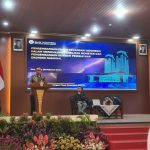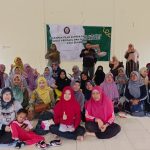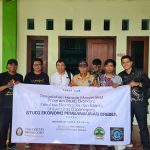Semarang, February 21, 2025 – The Department of Economics and Development Studies held a turbulence study with the theme “The Gap in Islamic Macro Thought: Taklif and Macro Aggregate Behavior”. This event presented Prof. Akhmad Syakir Kurnia, S.E., M.Si., Ph.D as the main speaker and Mesi Herawati, S.E., M.E. as the moderator. This study was held offline in the Meeting Room of Building C, Economics Study Program, Diponegoro University (Undip), and online via the Zoom platform, allowing wider participation from various academics and students.
This study aims to discuss the relationship between the concept of taklif in Islam and macroeconomic aggregate behavior. Some of the main questions that are the focus of the discussion include: is the macro phenomenon the result of the aggregation of micro behavior? Does individual obedience to taklif or the burden of sharia law automatically reflect macro behavior? If not, how should the Islamic macro concept be constructed?
In addition, this study also traces the evolution of macroeconomic thinking from various schools of thought, starting from classical thinking that assumes a linear relationship between micro and macroeconomics. However, Keynes’ theory in The General Theory of Employment, Interest, and Money shows that macro phenomena do not always reflect micro behavior, especially after the Great Depression. Over time, various macroeconomic theories have developed, including the modern growth theory pioneered by Daron Acemoglu. This theory highlights factors that influence long-term economic growth, such as innovation, institutional policies, and investment in human resources and technology.
Discussion session on turbulence studies
In the context of Islam, this discussion also discusses the Islamization of knowledge approach, which is heavily influenced by the thoughts of Naquib al-Attas and Ismail al-Faruqi. Al-Attas emphasized the importance of internalizing values and morals in science, as a response to the tendency of modern science to move away from moral aspects. Meanwhile, al-Faruqi argued that Muslims need to master modern economics while understanding the heritage of Islamic science and build a creative synthesis that still meets scientific principles before being disseminated to the wider community. This approach seeks to integrate conventional economics with Islamic principles, while eliminating concepts that conflict with Islamic teachings, including in the epistemology of the concept of profit and loss. Islam itself emphasizes normative values (das sollen) rather than merely descriptive (das sein), with the Qur’an and Sunnah as primary sources, and scientific interpretations and hypotheses as secondary sources.
The study was conducted online with Zoom
The study participants are expected not only to stop at the process of Islamization of knowledge, but also to be aware of the major challenges faced by Muslims in the development of economics. After the 12th century, science in the Muslim world stagnated due to the dominance of European civilization. Awareness of this backwardness gave birth to Islamic movements such as the Muslim Brotherhood by Hasan al-Banna, which aimed to revive the role of Islam in various aspects of life, including the economy. However, the approach that was relevant in the past is not necessarily adequate to answer the challenges of today. Therefore, economic thinking is needed that is no longer pragmatic and merely reactive to global developments, but is more idealistic and oriented towards the concept of justice and universal welfare. Islamic economics must be able to present a macro concept that is not only based on economic growth, but also social balance, fair distribution, and the principle of sustainability. With a more holistic approach and based on Islamic values, it is hoped that an economic system can be born that is not only competitive but also contributes to human civilization more broadly.








